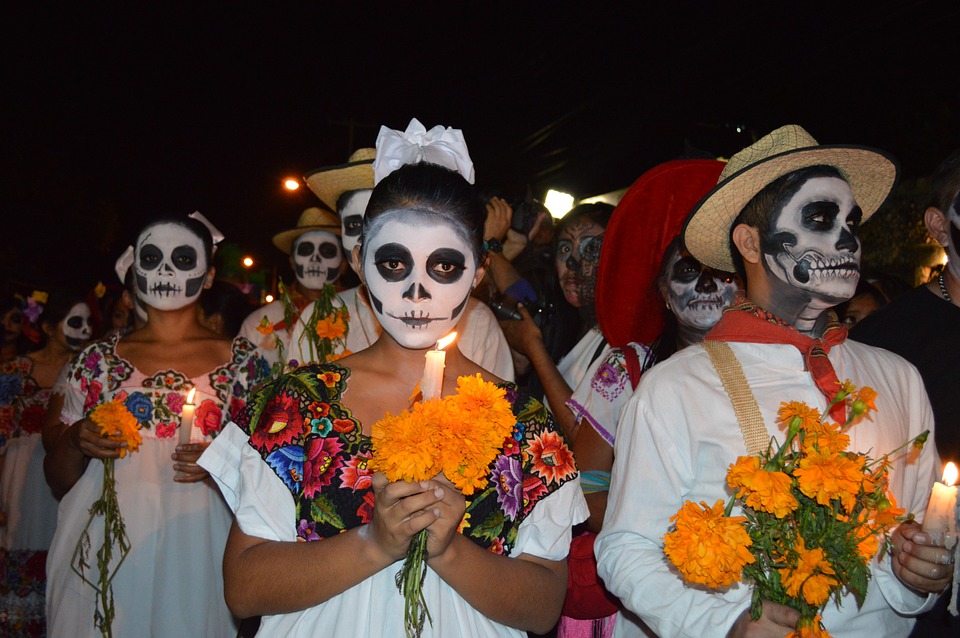|
To many, it would be difficult to believe that a holiday full of colors, food, drinks, and joyous motifs represents a celebration of death. but this is what happens in many countries in Latin America and year after year they commemorate the Day of the Dead (Dia de Muertos) and even though they all share the same meaning, each one adds a personal touch.
With the inheritance of the indigenous culture, the Latin Americans who celebrate this holiday take advantage of the occasion to draw near to their deceased loved ones. Remember them but also to celebrate life.
The inhabitants of Mesoamerica such as the Aztecs, Maya or Nahuas put on a festival in the beginning of August that lasted an entire month, the celebration had the name ''Day of the dead'' (Dia de Muertos)
|
|
|
Due to its geographic origins, Mexico is accordingly the country that symbolizes this particular festivity in Latin America, UNESCO has even declared the Mexican celebration an intangible cultural heritage to humanity given that it is one of the most relevant representations of Mexico's heritage and of the world. But what is this holiday and how is it celebrated?
|
|
|
Well, first of all in Mexico the celebration of the Day of the dead is a tradition in which one pays homage to the ancestors of our family and friends that have abandoned their earthly life, it is a celebration full of mysticism and symbolism that in the majority of the towns begins the 28th of October and end November 2nd.
Thanks to the synchronization of the Spanish and indigenous customs, today it is connected to the celebrations of all saints day and all souls day in the Catholic church, but what's more is that it coincides with the dates of Halloween, a pagan celebration that has it's rooted in a Celtic festival and that, similarly to the Day of the Dead, has also combined Catholicism.
Notwithstanding this last fact, the two celebrations are very different and should not be confused with each other, rather, one should understand that the Day of the dead is not an adaptation of Halloween.
|
|
|
In the Day of the Dead celebrations, the soul of those who have left this life are received in our homes and cemeteries with great joy and with offerings of food and drinks, lights and flowers understanding death as something natural that represents the beginning of the journey to spiritual rest.
It's a celebration whose solemnity and religiosity are visibly marked in the celebratory environment for our ancestors mankind had a soulful and immortal entity that gave them consciousness and that continued its journey after death in the world of the dead toward Mictlan where there is no hell nor heaven but rather a place where one would find their eternal rest in which their soul would be freed and they would be compensated with the presence of Tonatiuh, the sun god.
|
|
|
In the Mexica calendar, Xiuhpohualli, containing 18 months, at least 6 celebrations were held dedicated to the dead, the most important being the celebration of the discarnate; presided by the goddess Mictecacihuatl, mistress of the dead and queen of Mictlan beside Mictlantecuhtli, God of shadows and lord of the place of the dead.
In Latin American culture, during the festivities of the Day of the dead, the souls of the deceased ancestors return to the world of the living to visit their loved ones, in this celebration, we invite the dead to return home, where we will receive them in family with great joy and offerings that include their favorite food and drinks, with flowers, candles, incense and copal with fruit, bread, with salt to purify their soul, and also with water the source of life. The souls are received also with prayers, incorporated through Christianity upon the arrival of the Spanish but they are also received with music, they are visited in the cemetery and they spend time together.
|
|
|
Now that we know more about the origins and the representations of this holiday, we can clearly affirm that the Day of the Dead in Mexico is not an adaptation of Halloween. and while both share the ideas of the closeness between the world of the dead and the world of the living they don't agree at all in their views of death itself, the mingling with the spirits, nor their symbolism.
It is precisely the beauty of the symbolism of the Day of the Dead that makes his celebration a holiday that we truly should learn to appreciate and that also has present, more than any other holiday, the importance to be united to our loved ones both living and dead. In families, we form part of a singular community, and we share the same destiny, death. A natural event that we should not fear.
|
|
|










